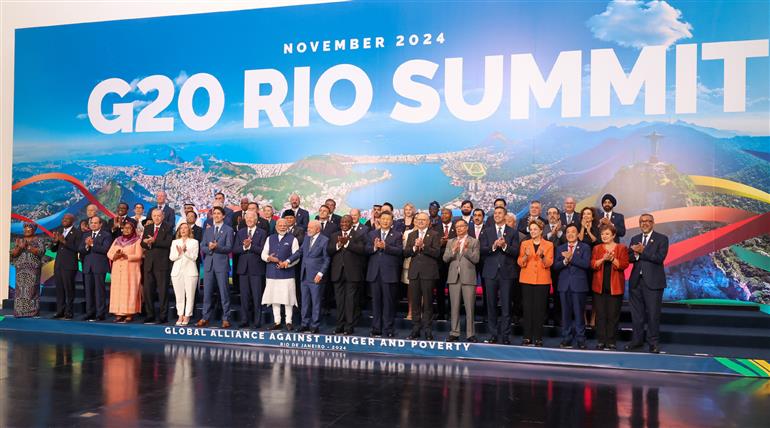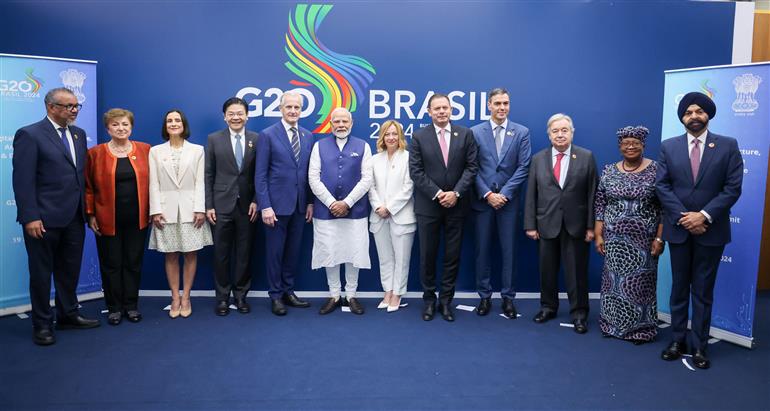G20 declaration on Digital Public Infrastructure, AI and Data for Governance – Joint Communiqué by the G20 Troika (India, Brazil and South Africa), endorsed by several G20 countries, guest countries and international organizations is the highlight of this event.
The global economy is navigating through unprecedented times, with growth at just over 3 percent—the lowest since the turn of the century when an average of nearly 4 percent was the norm before the pandemic. However, amid these challenges, the rapid advancement of technology offers a transformative opportunity. Equitably deployed, technology has the potential to revitalize growth, reduce inequality, and significantly bridge gaps in achieving the Sustainable Development Goals (SDGs).
Recognizing this potential, the G20 Troika—comprising India, Brazil, and South Africa—has issued a joint communiqué, the “Declaration on Digital Public Infrastructure, AI, and Data for Governance.” This declaration, endorsed by several G20 nations, guest countries, and international organizations, underscores the pivotal role of inclusive digital transformation in driving global development. The declaration builds upon key milestones such as the Global Digital Compact adopted at the UN Summit of the Future and the Global Digital Public Infrastructure (DPI) Summit held earlier this year in Cairo, Egypt.
The Role of Declaration on Digital Public Infrastructure and AI in Achieving SDGs
Accelerating progress toward the SDGs demands a concerted effort to leverage Declaration on Digital Public Infrastructure and artificial intelligence (AI) in governance. The communiqué highlights that well-designed DPIs, augmented by AI, can harness data for development, fostering economic growth, creating new jobs, and improving health and education outcomes. By enabling citizens and businesses to connect seamlessly to technological systems, DPIs have the potential to transform lives and strengthen democratic principles.
Several G20 nations have already demonstrated the success of such frameworks. By adopting open, modular, interoperable, and scalable design principles, these systems allow private sector players in sectors such as e-commerce, health, education, and finance to integrate and innovate. Over time, as populations grow and national needs evolve, such systems can adapt seamlessly, ensuring sustainability and scalability.

Inclusive and Secure Technology for Citizen Empowerment
Central to this vision is the focus on inclusivity, security, and privacy. The communiqué emphasizes that technological systems should prioritize citizens, enabling small and large businesses alike to improve livelihoods. Declaration on Digital Public Infrastructure ensures that technology becomes a tool for empowerment rather than exclusion, fostering equitable development and reducing societal divides.
A technology-neutral approach is proposed to ensure a level playing field for market participants. Such an approach is critical for fostering competition and innovation while addressing the asymmetries prevalent in the digital economy. By creating fair and equitable principles for data governance, the communiqué seeks to address critical issues such as data protection, privacy, intellectual property rights, and the security of confidential information.
Building Trust Through Transparency and Fair Governance
Trust emerges as Declaration on Digital Public Infrastructure in the deployment of digital and AI-driven systems. For these technologies to thrive in democratic societies, transparency in operations, appropriate safeguards, and fairness in governance are indispensable. Citizens must have confidence that their rights are respected and that technological systems operate in a manner that is just and accountable.
The communiqué stresses the importance of foundation and frontier AI models being trained on diverse, representative datasets. Such models must reflect the linguistic and cultural diversity of societies to ensure they serve global populations equitably. By doing so, AI technologies can address the unique needs of diverse communities while upholding inclusivity and fairness.
The Economic Imperative of Digital Transformation
The communiqué outlines the economic benefits of digital transformation, emphasizing its role in job creation and sustainable growth. When technological systems enable businesses to thrive, they improve the livelihoods of families and neighborhoods, creating a ripple effect of economic prosperity. The declaration acknowledges that inclusive and development-oriented systems are essential for unlocking these benefits.
Moreover, the communiqué calls for international collaboration to address the challenges posed by the digital economy. By adopting common design principles and fostering interoperability, nations can create a cohesive digital ecosystem that transcends borders, enabling businesses and individuals to thrive in a globally connected economy.
A Call to Action for Global Leaders
The endorsement of the “Declaration on Digital Public Infrastructure, AI, and Data for Governance” by multiple nations and organizations underscores its significance as a roadmap for global digital transformation. It is a call to action for world leaders to collaborate in creating inclusive, secure, and transparent systems that prioritize citizen welfare.
The declaration aligns with the G20’s broader mission of promoting sustainable development and equitable growth. It serves as a reminder that, while technology evolves at a dizzying pace, its potential to uplift humanity can only be realized through deliberate, inclusive, and responsible deployment.
As the global community strives to recover from economic stagnation and navigate the complexities of the 21st century, the communiqué offers a vision of hope and opportunity. By embracing digital public infrastructure and AI as tools for governance, nations can bridge inequalities, enhance democratic principles, and foster sustainable growth.
The joint declaration by India, Brazil, and South Africa sets a precedent for international cooperation in leveraging technology for development. It challenges global leaders to rise to the occasion and harness the power of innovation to transform lives and build a future where no one is left behind.






